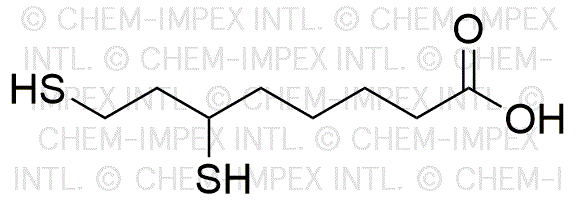Lipoic acid, reduced is widely utilized in research focused on:
- Antioxidant Therapy: This compound is known for its potent antioxidant properties, making it valuable in formulations aimed at reducing oxidative stress in cells. It's particularly beneficial in the fields of dermatology and aging research.
- Diabetes Management: Lipoic acid, reduced has shown promise in improving insulin sensitivity and glucose metabolism, which is crucial for diabetes management. This application is significant for healthcare professionals working with diabetic patients.
- Neurological Health: Research indicates that this compound may help protect against neurodegenerative diseases by reducing inflammation and oxidative damage in the brain, making it relevant for neurologists and researchers in cognitive health.
- Cardiovascular Support: Its ability to improve endothelial function and reduce inflammation can support heart health, which is beneficial for cardiologists and patients looking to enhance their cardiovascular wellness.
- Supplement Industry: Due to its various health benefits, lipoic acid, reduced is commonly used in dietary supplements. This application is particularly relevant for manufacturers and health-conscious consumers seeking natural health solutions.
General Information
Properties
Safety and Regulations
Applications
Lipoic acid, reduced is widely utilized in research focused on:
- Antioxidant Therapy: This compound is known for its potent antioxidant properties, making it valuable in formulations aimed at reducing oxidative stress in cells. It's particularly beneficial in the fields of dermatology and aging research.
- Diabetes Management: Lipoic acid, reduced has shown promise in improving insulin sensitivity and glucose metabolism, which is crucial for diabetes management. This application is significant for healthcare professionals working with diabetic patients.
- Neurological Health: Research indicates that this compound may help protect against neurodegenerative diseases by reducing inflammation and oxidative damage in the brain, making it relevant for neurologists and researchers in cognitive health.
- Cardiovascular Support: Its ability to improve endothelial function and reduce inflammation can support heart health, which is beneficial for cardiologists and patients looking to enhance their cardiovascular wellness.
- Supplement Industry: Due to its various health benefits, lipoic acid, reduced is commonly used in dietary supplements. This application is particularly relevant for manufacturers and health-conscious consumers seeking natural health solutions.
Documents
Safety Data Sheets (SDS)
The SDS provides comprehensive safety information on handling, storage, and disposal of the product.
Product Specification (PS)
The PS provides a comprehensive breakdown of the product’s properties, including chemical composition, physical state, purity, and storage requirements. It also details acceptable quality ranges and the product's intended applications.
Certificates of Analysis (COA)
Search for Certificates of Analysis (COA) by entering the products Lot Number. Lot and Batch Numbers can be found on a product’s label following the words ‘Lot’ or ‘Batch’.
*Catalog Number
*Lot Number
Certificates Of Origin (COO)
This COO confirms the country where the product was manufactured, and also details the materials and components used in it and whether it is derived from natural, synthetic, or other specific sources. This certificate may be required for customs, trade, and regulatory compliance.
*Catalog Number
*Lot Number
Safety Data Sheets (SDS)
The SDS provides comprehensive safety information on handling, storage, and disposal of the product.
DownloadProduct Specification (PS)
The PS provides a comprehensive breakdown of the product’s properties, including chemical composition, physical state, purity, and storage requirements. It also details acceptable quality ranges and the product's intended applications.
DownloadCertificates of Analysis (COA)
Search for Certificates of Analysis (COA) by entering the products Lot Number. Lot and Batch Numbers can be found on a product’s label following the words ‘Lot’ or ‘Batch’.
*Catalog Number
*Lot Number
Certificates Of Origin (COO)
This COO confirms the country where the product was manufactured, and also details the materials and components used in it and whether it is derived from natural, synthetic, or other specific sources. This certificate may be required for customs, trade, and regulatory compliance.

